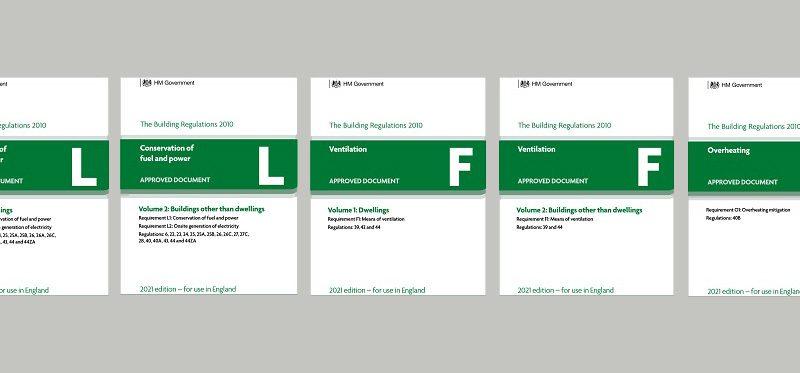
The Approved Inspector: An Alternative to Local Authority Building Control
Building Regulations approval is required on almost every building project, including those that are permitted development under the planning system, and even for internal alterations to your home or office.
In this blog we talk to Approved Inspector Geoff Wilkinson* and ask him about the Approved Inspector system which is the alternative way to get Approval instead of using the Local Authority Building Inspector.
*(Geoff is Managing Director of Wilkinson Construction Consultants and writes the Building Regulation column every month in Architects Journal)
So what does an Approved Inspector do?
The service itself is essentially the same as the councils – the Approved Inspector will check and approve the plans, and then come out and inspect the works being carried out at various stages. I should point out though that the Approved Inspector system is a complete alternative to the Council service, the Approved Inspector is the actual decision maker, not a subcontractor for the council.

How is that possible?
The Government in the 1980’s recognised that the Building Control System was broken and causing great problems to developers as there was no choice in service provision. If your Local Council was short staffed you had no choice but to wait for your application to be processed. Worse still if the Local Authority Union went on strike your building site shut down while you waited to have your work inspected and approved. As a result they decided to introduce competition into the market as a way to improve standards. Successive Governments have recognised the role that Approved Inspectors have played in fixing the problems of the 1980s.
So can anyone become an Approved Inspector?
In short no – not everyone can become an Approved Inspector. Licenses are only issued by the Construction Industry Council and applicants have to prove that they are qualified and experienced to the necessary level before they can practice. This typically means that they hold RICS or equivalent qualifications, have 5 years post qualification experience, have complaints procedures and insurance in place in case anything went wrong, undertake continuous training of staff, and sign up to performance standards. The licenses are reviewed every 5 years there are sanctions that can be taken against Approved Inspectors that fail to perform. Interestingly there are no such requirements for Council Building Inspectors and the Government are now encouraging councils to apply to become Approved Inspectors.

How does the service differ?
The difference is generally in approach as after all both services essentially offer the same thing – a statutory check that building regulations are being followed. Approved Inspectors are commercially aware (they are businesses themselves after all), so understand that the important thing to a client is that works are completed on time and on budget. As a result they look to find ways to help you comply and offer advice early in the process to avoid the need to correct defective work. We don’t justify our fee by trying to find faults!
That may sound like we try to cut corners, but let me explain more. Since the 1980’s the building regulations have been cast in a functional form rather than being prescriptive In plain English this means that there are many different ways that you can show compliance, not just by following the Approved Documents . Approved Inspectors are more flexible in interpretation of the regulations as they are aware of these alternative routes. Also there is no political interference in the decision making process. Unfortunately many Local Authority Building control departments sit beneath Town Planners and in some cases they look to Gold Plate the minimum requirements in order to meet party political aspirations. The Government are trying to stop this completely by bringing all of the technical requirements out of the control of planners and into the Building Control system (see the Housing Review)
Lastly I should point out that Approved Inspectors have a duty to turn down work if they do not have the resources and experience to cope. The reverse is true of the Council service, who cannot refuse to accept a valid application. Councils are permitted 5-8 weeks in order to process an application and during busy periods Local Authority staff can be overstretched to breaking point to meet these targets. In some cases they end up rejecting applications in order to meet those deadlines , whereas there are no such deadlines using Approved Inspectors. As a result turnaround times are typically 5-10 days, instead of 5-8 weeks.

So who are these Approved Inspectors?
Approved Inspectors can vary from large corporate practices of around 100 surveyors covering the whole of the country to small local businesses employing just 1 or 2 staff. Some specialise in particular sectors, such as housing, offices, or retail, whilst others work across all sectors. For the most part Approved Inspectors attract the very best ex Local Authority staff who want to concentrate on delivering high quality services and are fed up with the bureaucracy of Local Government. They don’t just work 9am – 5pm and are on hand to give advice from the earliest stage – often pre planning to ensure that your design wont be rejected
Sounds great, but its not been tried and tested has it?
Actually it has been – Approved Inspectors were first introduced in the 1980’s and there are now around 60 or so licenses in place, a full list can be seen on the Construction Industry Website.
Why haven’t I heard about this before then?
For many years Approved Inspectors only operated in the commercial sector as the first licenses excluded housing. As a result most of the big commercial developments and many government departments used Approved inspectors whilst small residential developers didn’t. The Government recognised this issue and changed the rules to enable Approved Inspectors to operate on a level playing field and as a result most will now take on smaller projects too.
It sounds like it must be more expensive then?
Not necessarily, Approved Inspectors are able to operate without the costs of Local Authority services, operating from small local offices rather than grand civic centres. As a result fees are generally competitive, often within 10% of the Council fee and sometimes even cheaper. More importantly though Building Control fees are typically no more than 1-2% of the cost of a project £600 – £1000 on a typical £30K – £50K extension, and the right choice of Approved Inspector can save significantly more than that in delay and correcting defective works.
Thanks Geoff
We have utilised the services of Wilkinson Construction Consultants on a number of projects over the years and their assistance and advice, both in the early stages of a project and during, is truly second to none! The ability to work closely with the inspector from the outset, who will ultimately be later inspecting and signing off the completed construction works, makes for a much smoother process on site.
But don’t just take our word for it! Many of our clients, previously not aware that the service even existed, have been particularly impressed with the speed and efficiency of the service and have provided countless positive comments regarding the inspectors they have met and worked with.




